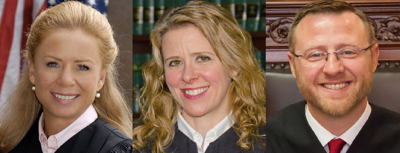
Ziegler, Grassl Bradley and Hagedorn
MADISON, Wis. - An abortion decision always loomed from the Wisconsin Supreme Court, a body that unexpectedly became one of the biggest battlegrounds for political ideologies nationwide and has seen millions in out-of-state spending on two recent record-setting elections.
And given that the conservative minority hasn't tried to hide its feelings for how the four liberals handle important decisions involving issues like ballot boxes and "hazardous" substances, it seemed likely a lawsuit over an old abortion law filed in the wake of the U.S. Supreme Court overturning Roe v. Wade would only deepen the split - if not blow the court apart.
The three conservatives filed nearly 50 pages of dissenting opinions last week after liberals found the 176-year-old abortion ban had been wiped away by newer laws passed while Roe was the law of the land.
"We conclude that comprehensive legislation enacted over the last 50 years regulating in detail the 'who, what, where, when and how' of abortion so thoroughly covers the entire subject of abortion that it was meant as a substitute for the 19th century near-total ban on abortion," Justice Rebecca Frank Dallet wrote for the majority.
Conservatives have been left voicing their frustrations in dissenting opinions since liberals took control of the court, with Justice Rebecca Grassl Bradley calling the result in one case over fees for medical records "tyranny." They’ve called the libs “rogue justices” and accused them of a power grab, and all three conservatives filed dissents in the abortion case, painting the liberals as activists who have taken over Wisconsin policy-making.
What follows is a selection of quotes telling the story of conservative frustration in the swing state, in which Republicans hold both houses of the legislature but the governor and attorney general are Democrats.
"Put bluntly, our court has no business usurping the role of the legislature, inventing legal theories on the fly in order to make four justices’ personal preference the law" - Justice Annette Ziegler.
Wisconsin had conflicting laws on abortion - one predating Roe that mostly outlawed the practice and others specifying what types of abortions were legal when women were given that right during Roe. The majority decided those Roe-era laws "impliedly repealed" the older statute.
"Today’s decision may be popular, but the result comes at great cost to the constitution and the rule of law" - Justice Ziegler.
The abortion case was of one of the main reasons why heavyweight Democrat donors threw their support behind Janet Protasiewicz in 2023 and Susan Crawford in 2025 in the two most-expensive statewide judicial elections in America's history. A recent poll confirmed "overwhelming" support for access to abortion from Wisconsin's citizens.
"Our court is particularly ill-equipped to decide the issue of abortion. Our court should not, and particularly this majority should not, decide the issue because Justices on this court have - very recently - publicly made their views regarding abortion known" - Justice Ziegler.
Protasiewicz campaigned on her support for abortion rights, even calling the old abortion ban "draconian." She hinted at a ban on abortions at 20 weeks, which came to fruition in the July ruling.
"Judges incapable of rendering impartial judgments based on the law must recuse" - Justice Grassl Bradley.
Conservatives wondered whether Protasiewicz would be allowed to hear a case in which she obviously brought her own personal preferences. Grassl Bradley's gripe comes from the concurring opinion on Justice Jill Karofsky, who mourned the loss of women who died from poor care in states with restrictions on abortion.
"With no apparent sense of irony, the concurrence claims abortion restrictions amount to 'death warrants' for women, ignoring the people who feel just as passionately that abortion kills innocent human lives - more than 1,000,000 in each of the last two years" - Justice Grassl Bradley.
See this fact sheet on the recent rise in abortions, which last year produced 15.4 abortions per 1,000 women.
"Voters may be impatient with the political impasse between the governor (a Democrat) and the legislature (majority Republican) - on this issue and perhaps others. Electing justices who fancy themselves super legislators, however, comes at a steep price. The People of Wisconsin have surrendered self-governance to four liberal lawyers. No one, regardless of political leanings, should want any four lawyers to make all of the important decisions for we the People - absent debate,discussion or compromise" - Justice Grassl Bradley.
Democrat Attorney General Josh Kaul teamed with others to bring the lawsuit to strike the abortion ban. Noticeably absent from the list of parties that submitted amicus briefs was the Legislature. It has filed briefs on other hot topics in the past.
"Sure, the majority opinion is laden with legal jargon a reader might think reflects a reasoned judicial opinion. Don't be fooled. This is pure policymaking, driven by antagonism toward a law the majority does not like" - Justice Brian Hagedorn.
Laws remain the law until repealed. Giving deference the legislature's ability to understand what laws are in effect, in only two instances can something be "impliedly" repealed, as here: When a law creates an irreconcilable conflict to which a person couldn't comply with both and when a new law engulfs the old one.
"The majority, then, cannot identify a single Wisconsin authority employing the covering-the-field theory of implied repeal in a way that supports its novel approach here. It holds that a whole series of discrete laws over decades were meant by the legislature to be the sole governing law on a topic and repealed just one of the statutes that came before. The majority may style itself as just applying established law, but it is doing nothing of the sort; its newly invented cover-the-field rule has no precedent in the Wisconsin reports" - Justice Hagedorn.
It's a familiar message from other recent dissents - that liberals are twisting rather than interpreting laws on the books. In a case over whether absentee voters could put votes in drop boxes, liberals overturned the interpretation of a law reached by a conservative majority just two years earlier.
"What does the majority have to say about the legislature’s latest reference to (the abortion ban), and subsection (1) in particular, as an ongoing enforceable abortion statute? Not a single thing. It doesn’t even give it the old college try" - Justice Hagedorn.
It was just 2015 when the legislature cited the law when passing a ban on abortions after 20 weeks and again when discussing crimes in John Doe proceedings.
"The majority has no answer for why the legislature would reference, and make provision for, a criminal proceeding under a statute it had already repealed. This is the final nail in the majority's opinion. The legislature obviously believed (the abortion ban) remained a valid law in 2015, and the majority does not argue that the legislature has done anything since to suggest otherwise" - Justice Hagedorn.








